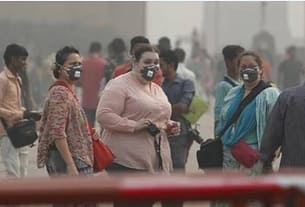While there is some evidence that an odd-even vehicle policy reduces pollutant levels, experts say the available data lacks consistency, and the reduction achieved may not be sufficient to address health-related impacts.
“It is not even a band-aid,” said Dr Sagnik Dey, professor and coordinator, Centre of Excellence for Research in Clean Air at the Indian Institute of Technology-Delhi.
Can odd-even prevent health issues?
Explaining why odd-even is not a long-term solution, Dr Dey said: “With several exceptions, odd-even doesn’t really cut the number of vehicles plying on the roads by 50%. More importantly, the reduction in emissions doesn’t always mean a reduction in the pollutant concentration in the air, as that depends on meteorological factors like wind speed. The evidence so far shows an uneven impact — while some areas have seen reductions, others have not, or the reduction has been only for a few hours.”
Dr Karan Madan, additional professor of pulmonary, critical care, and sleep medicine at AIIMS, Delhi, agreed: “When the PM2.5 levels are over 500, a 20% decrease would mean a drop to only 400. That is still very harmful.”
Long-term exposure to pollution is associated with increased risk of hypertension, diabetes, and cardiovascular diseases like heart attacks and strokes. It is known to increase the risk of chronic lung diseases, cancers, lower immunity, and also leads to depression.





